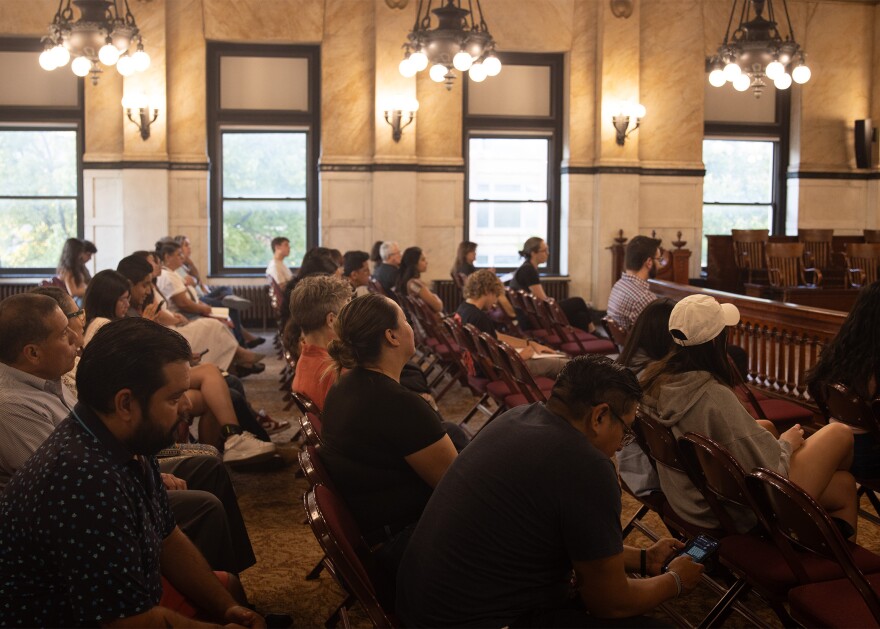To kick off Hispanic Heritage Month, the McLean County Museum of History on Tuesday night held a community conversation on the experience of Latino immigrants.
The program, “Navegando una Nueva Comunidad: Recent Immigrant Arrivals in the Bloomington-Normal Community,” featured a panel discussion moderated by Latin American Studies professor Maura Toro-Morn and anthropology graduate student Vanessa Hernandez-Gutierrez from Illinois State University.
Panelist Camila Graunke works with the The Immigration Project, an organization that has been connecting new arrivals with community resources and nonprofit legal assistance since 1995. The organization has served immigrants from more than 60 countries from its offices in Bloomington-Normal, Champaign-Urbana, and Springfield. The agency has ambitions to expand with grant funding in the near future, with the potential to serve four times as many clients.

Graunke is pursuing a career as a therapist, hoping to offer services to immigrants new to Central Illinois. She said the stresses of relocation for migrants and refugees are rarely researched or addressed, in part because few in the field have the right experience.
“There’s also very few providers that are Spanish speakers. I’m one of a handful of providers, and I haven’t even graduated — I’ve already got a wait list,” Graunke said.
“And that’s so hard, that’s so hard to navigate. Because it’s not that the need isn’t there, it’s that there are just not enough people who are able to help and facilitate that.”
The language barrier was a common topic throughout the evening, as one of the biggest immediate hurdles Latinx arrivals face. Panelists articulated a double-sided difficulty to both learn English and retain Spanish. Graunke said growing up in a largely white community, she spoke no Spanish for some time until a friend adopted from Hong Kong helped encourage pride in her origin.
Panelist Yolanda Alonso arrived in Bloomington-Normal in 2019. She noted an absence of Spanish-speaking media in the community and, using her background as a journalist, started the online blog Latinos en BloNo. In addition to sharing stories, the blog offers advice on local activities. Alonso promotes collaborations like Twin City public libraries offering bilingual material and conversational English programs.

Bloomington Public Library currently hosts an exhibit on Latinx history, and Alonso spoke of the value of people seeing their experiences represented.
“I am part of the community and I can be here also, in the exhibit, in their walls. It’s an important space and an important exhibit for the Latino community,” Alonso said.
Fellow panelist Miriam Padilla spoke of the stress that can result when communication barriers and culture shock impact parenting. Padilla made her comments in Spanish, with moderator Hernandez-Gutierrez providing summary translations.
“It’s filled her with a lot of frustrations and anxiety,” Hernandez-Gutierrez said.
“The inability to express yourself, the inability to be involved in your child’s life as you would be in Mexico, where it tends to be a lot more united and involved. Unfortunately, here she can’t do that.”
Stacking the difficulties of immigration on top of those of parenting can become a herculean task, the panelists agreed. Panelists spoke of multiple ways to help one another through the immigration experience. Alonso’s Latinos en BloNo and a 250-plus person Spanish language group chat started by Padilla were among the efforts praised, along with the efforts of The Immigration Project that also was represented on the panel by Jair Bustos.

In addition to his day job, Bustos appreciated the value of finding Latinx spaces all over town for support and understanding. Like some other panelists, he found this in church, but also spoke of the ability to help create new welcoming spaces, as he’s done teaching jujutsu.
“So I’m always trying my hardest to, if it is the Spanish that’s stopping you from doing the sport, I’m trying to let them know, ‘Hey, I speak Spanish, I can also help. You’re part of this community if you’d like to be.’”

The narrative of immigrants making positive contributions and helping one another was the through line of the evening.
The fifth and final panelist, Jesús Islas, spent some time moving between states before taking a job with Rivian. He said he was happy to find a community he felt would be right to raise his children, and that welcomes immigrants from elsewhere in the world, citing Indian arrivals as an example.
Moderator Maura Toro-Morn said the event functioned to introduce new voices, highlighting their contributions and the challenges still to overcome. She also hopes dialogues with the Latinx community will challenge narratives that rely on fear or hatred of immigrants that she is seeing in national politics.
“What is the other side of that story? The other side of that story is that historically, this nation has been built by immigrants. Immigrants continue to be a part of our community, and immigrants are the heart and soul of this country,” said Toro-Morn.


